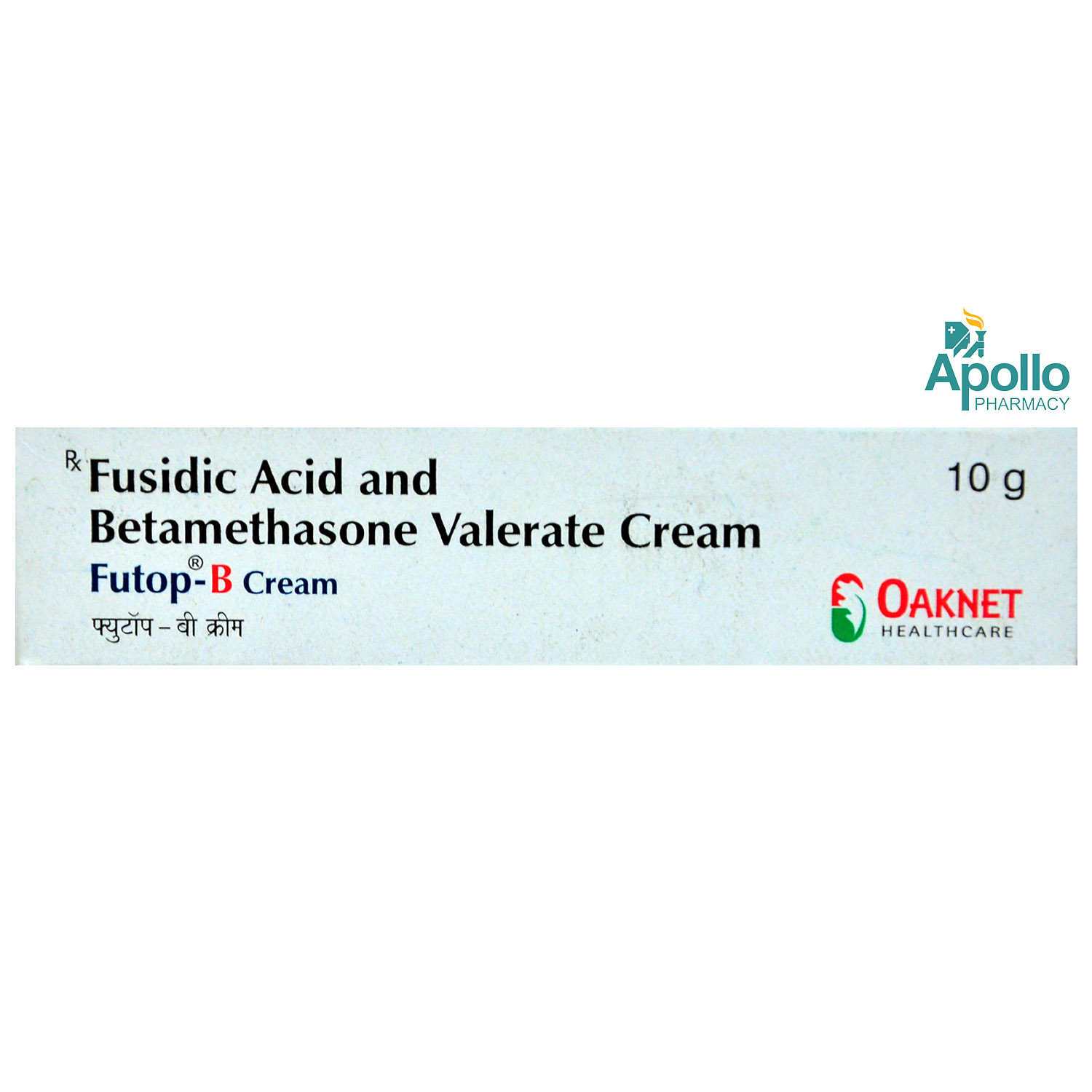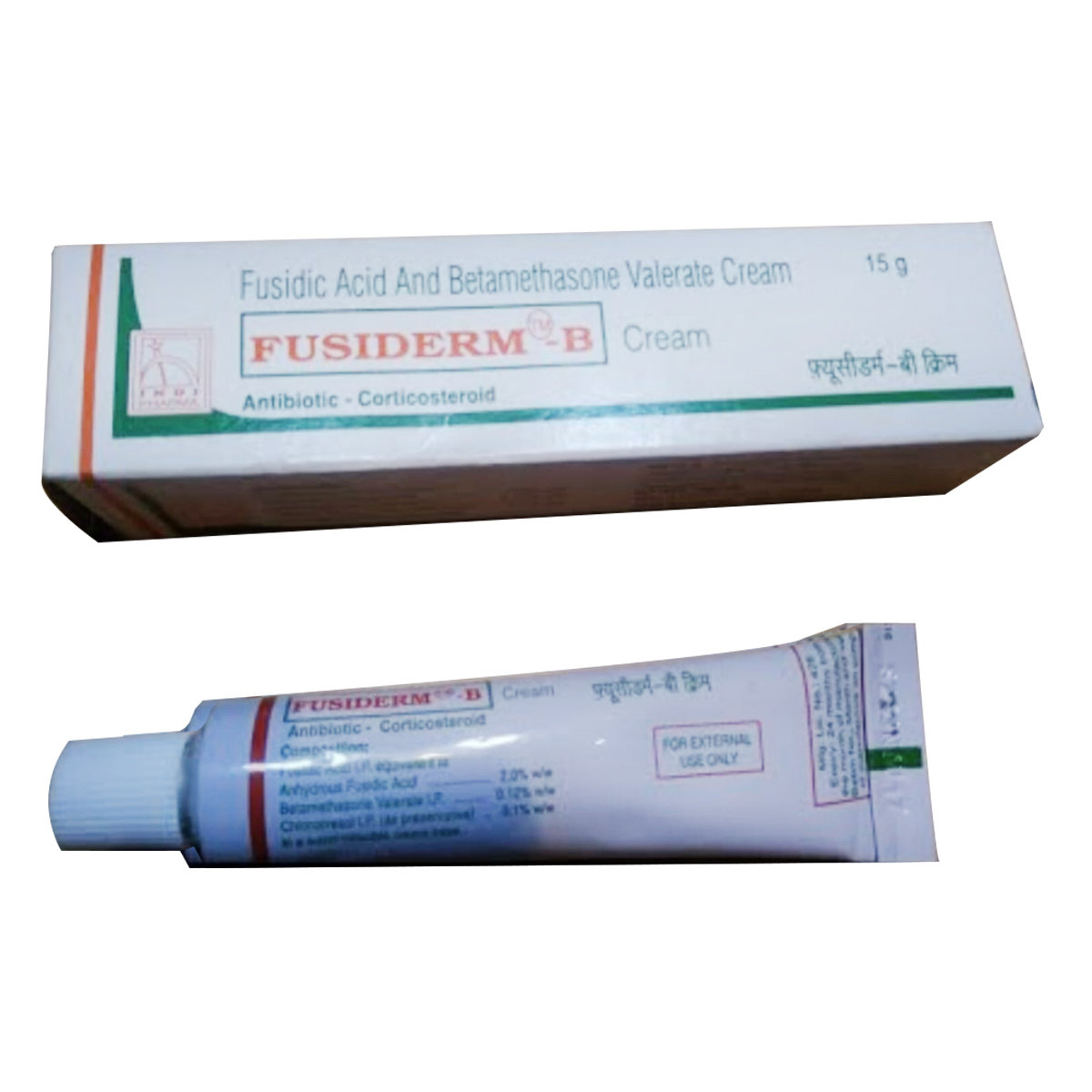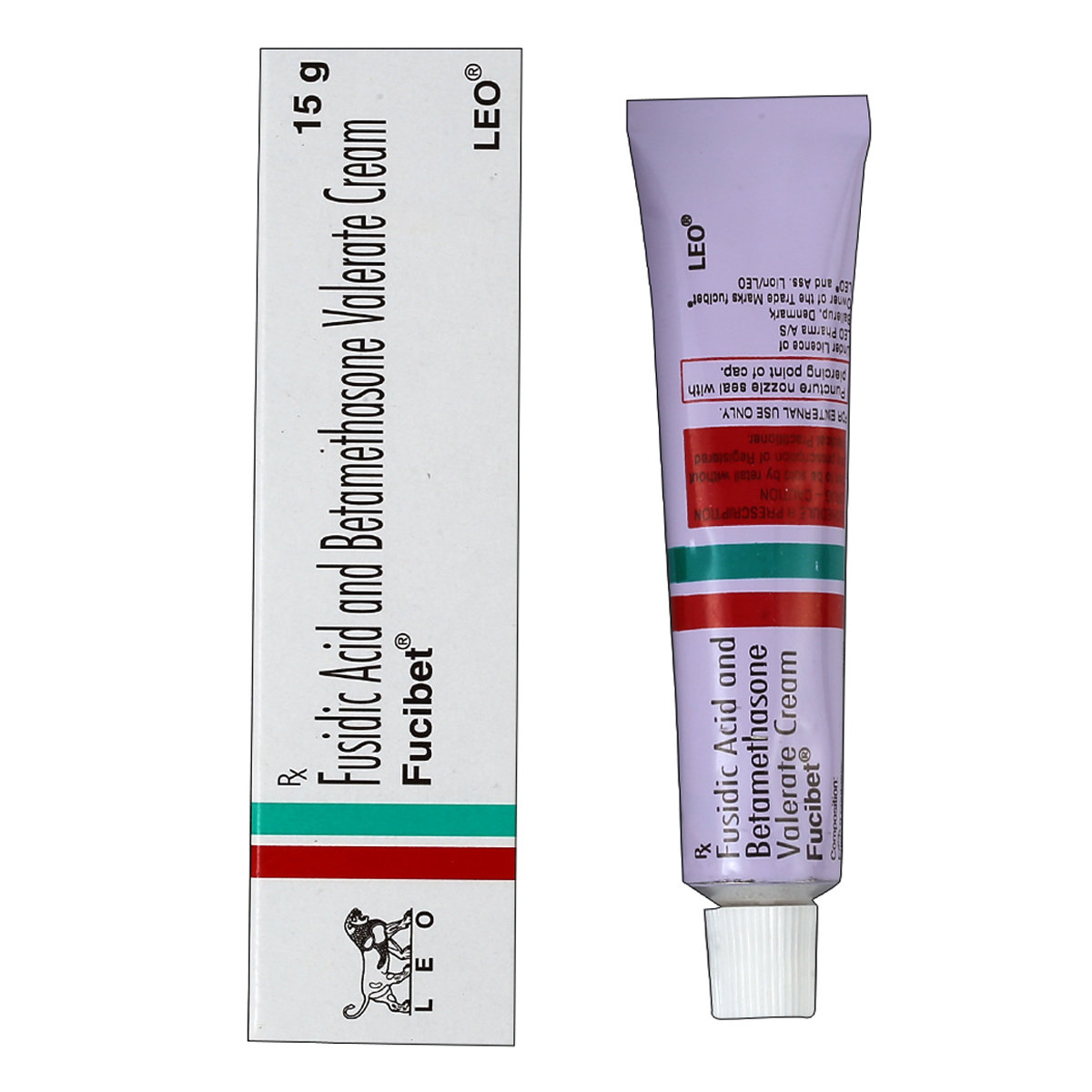Fusitop B Cream
MRP ₹62.27
(Inclusive of all Taxes)
₹9.3 Cashback (15%)
Provide Delivery Location

secured payment

india's most trusted pharmacy

genuine products
Composition :
Consume Type :
Return Policy :
About Fusitop B Cream
Fusitop B Cream is a dermatological medication primarily used to treat bacterial skin infections, such as eczema and dermatitis. Bacterial infection occurs when harmful bacteria grow in the body and causes disease. It can infect any part of the body and multiply very quickly. Eczema is a condition in which skin patches become inflamed, itchy, cracked, and rough. Some eczema types can also lead to blisters (a small bubble on the skin filled with serum and is caused by friction, burning, or other damage). Dermatitis is a skin condition that causes itchy, dry skin or a rash on swollen, reddened skin.
Fusitop B Cream is composed of two medicines: Betamethasone (corticosteroid) and Fusidic acid (antibiotic). Betamethasone belongs to the class of corticosteroids. Corticosteroids have anti-inflammatory, immunosuppressive, and antiproliferative (inhibit cell growth) properties. Betamethasone blocks prostaglandins (chemical messengers) production that make the affected area red, swollen and itchy. Betamethasone effectively treats inflammation and itchiness caused by eczema (inflamed and itchy skin) and psoriasis (skin cells build up and form scales and itchy, dry patches). On the other hand, Fusidic acid is an antibiotic and prevents the synthesis of essential proteins required by bacteria to carry out vital functions. It is used to treat infections like dermatitis (inflammation of the skin), spots, cuts, grazes, impetigo (weeping, crusty and swollen patch of skin), and folliculitis (inflammation of one or more hair follicles).
Your doctor will advise the appropriate dose that suits your infection. Fusitop B Cream has common side effects like itching, dryness, redness, and burning sensation at the application site. These side effects usually do not require medical attention and gradually resolve over time. However, if you face any other symptoms or the side effects persist longer, please consult your doctor.
Let your doctor know if you have any allergic reactions to Fusitop B Cream or other medications. Do not use Fusitop B Cream on thin skin, skin ulcers, broken veins or acne without a doctor's advice. Do not apply tight dressings and bandages on the skin's affected areas after using Fusitop B Cream unless the doctor advised. Fusitop B Cream is not recommended for use in diaper rash. Do not use Fusitop B Cream on sensitive areas like nostrils, ears, lips or genitals if the doctor did not advise you. Pregnant and breastfeeding mothers should consult the doctor before starting Fusitop B Cream.
Uses of Fusitop B Cream

Have a query?
Directions for Use
Key Benefits
Fusitop B Cream consists of two medicines: Betamethasone (corticosteroid) and Fusidic acid (antibiotic). Betamethasone is a corticosteroid and blocks prostaglandins' production (chemical messengers) that make the affected area red, swollen and itchy. It is used to treat inflammation and itchiness caused by eczema (inflamed and itchy skin) and psoriasis (skin cells build up and form scales and itchy, dry patches). On the other hand, Fusidic acid is an antibiotic and prevents the synthesis of essential proteins required by bacteria to carry out vital functions. It is used to treat infections like dermatitis (inflammation of the skin), spots, cuts, grazes, impetigo (weeping, crusty and swollen patch of skin), and folliculitis (inflammation of one or more hair follicles).
Storage
- Shield your skin from the sun by using sunscreen, seeking shade, and wearing protective clothing.
- Please don't smoke, as it damages the skin and reduces blood flow.
- Treat your skin gently by limiting bath time, using mild cleansers, and shaving carefully.
- Eat a healthy diet of fruits, vegetables, whole grains, and lean proteins.
- Stay hydrated by drinking plenty of water.
- Manage stress through sleep, exercise, meditation, and enjoyable activities.
- Additionally, use moisturizers to coat your skin with a protective barrier, and consider wearing sun-protective clothing.
- Apply a cold compress to the irritated area can help reduce redness and swelling.
- When applying medications that can cause irritation, switch up the application site each time to prevent excessive irritation in one area.
- Using a gentle, fragrance-free moisturizer can help keep the skin hydrated and reduce irritation.
- Wash the application site with mild soap and water before applying medication.
- Scratching can worsen irritation, so try to avoid scratching.
- Include zinc-rich foods like nuts and fish for collagen production.
- Eat foods high in vitamins A, C, and D like carrots, citrus fruits, and milk for skin health.
- Consume protein-rich foods like lentils, beans, broccoli, lean beef, and chicken for skin elasticity.
- Massage regularly to improve skin texture.
- Exercise regularly to improve skin elasticity.
- Focus on nutrient-rich foods for skin health.
- Use creams and oils like retinoid or hyaluronic acid creams to support skin health.
- Exfoliate regularly to improve skin texture.
- Practice regular skin care to protect and nourish your skin.
- Consider professional treatments like light or laser treatments, microdermabrasion.
- Maintain a healthy lifestyle by combining diet, exercise, and skincare for optimal results.
- Skin rash caused by allergies is due to irritants or allergens. Therefore, avoid contact with such irritants.
- Consult your doctor for proper medication and apply an anti-itch medication. Follow the schedule and use the medication whenever needed.
- Protect your skin from extreme heat and try to apply wet compresses.
- Soak in the cool bath, which gives a soothing impact to the affected area.
- Report the itching to your doctor immediately; they may need to change your medication or dosage.
- Use a cool, damp cloth on the itchy area to help soothe and calm the skin, reducing itching and inflammation.
- Keep your skin hydrated and healthy with gentle, fragrance-free moisturizers.
- Try not to scratch, as this can worsen the itching and irritate your skin.
- If your doctor prescribes, you can take oral medications or apply topical creams or ointments to help relieve itching.
- Track your itching symptoms and follow your doctor's guidance to adjust your treatment plan if needed. If the itching persists, consult your doctor for further advice.
Drug Warnings
Avoid contact of topical Fusitop B Cream with nose, mouth or eyes as it may irritate. In case the medicine comes in contact with these areas accidentally, rinse with water thoroughly. If you are pregnant, planning to conceive or are a breastfeeding mother, please consult a doctor before using Fusitop B Cream. Avoid smoking or going near naked flames since Fusitop B Cream can catch fire and burn easily. Fusitop B Cream is not recommended to use for diaper rash.
Drug-Drug Interactions
Drug-Drug Interactions
Login/Sign Up
Drug-Food Interactions
Drug-Food Interactions
Login/Sign Up
Diet & Lifestyle Advise
- Use mild soap while taking baths and prefer warm baths.
- Avoid harsh products on your skin.
- Do not scratch or pick your skin to avoid getting the affected area infected.
- Manage stress, eat healthily, drink plenty of water, exercise regularly, and get plenty of sleep.
- Limit intake of food that might trigger allergies such as dairy products, soy, eggs, and nuts.
- Avoid consumption of foods with excess sugar as it may flare-up inflammation.
- Include fruits, vegetables, whole grains, healthy fats and fish in your diet.
- Avoiding getting in contact with harsh soaps, detergents and rough fabrics.
Habit Forming
Therapeutic Class
All Substitutes & Brand Comparisons
RX
Futop B Cream 10 gm
Oaknet Healthcare Pvt Ltd
₹71
(₹6.4/ 1gm)
14% COSTLIERRX
Fusiderm-B Cream 15 gm
Indi Pharma Pvt Ltd
₹117
(₹7.02/ 1gm)
25% COSTLIERRX
Fucibet Cream 10 gm
Sun Pharmaceutical Industries Ltd
₹89
(₹8.01/ 1gm)
43% COSTLIER
Alcohol
Safe if prescribed
No interaction found/ established. Please consult your doctor before using Fusitop B Cream.
Pregnancy
Consult your doctor
Please consult your doctor if you are planning to become pregnant or already pregnant before starting Fusitop B Cream.
Breast Feeding
Consult your doctor
Please consult the doctor before using Fusitop B Cream if you are a nursing mother. However, it is advised not to use Fusitop B Cream on breasts before breastfeeding your baby.
Driving
Safe if prescribed
Fusitop B Cream has no or negligible influence on the ability to drive or use machines.
Liver
Consult your doctor
Let your doctor know if you have any history of liver diseases or hepatic impairment. Your doctor will weigh the benefits and potential risks before prescribing Fusitop B Cream.
Kidney
Consult your doctor
Let your doctor know if you have any history of kidney diseases. Your doctor will weigh the benefits and potential risks before prescribing Fusitop B Cream.
Children
Safe if prescribed
Fusitop B Cream can be used in children below 12 years of age under the supervision of the doctor. Your doctor will decide the dosage based on the child's age and weight.
FAQs
Fusitop B Cream consists of Betamethasone and Fusidic acid. Betamethasone, a corticosteroid, works by blocking prostaglandins' production (chemical messengers) that make the affected area red, swollen and itchy. Fusidic acid is an antibiotic and prevents the synthesis of essential proteins required by bacteria to carry out vital functions.
Fusitop B Cream is not meant for the treatment of fungal or viral infections. Avoid its use in the treatment of fungal infections like ringworm or athlete's foot, and viral infections, such as herpes or chickenpox and acne or rosacea.
The usual treatment time with Fusitop B Cream is two weeks. If you notice no improvement after seven days, stop using Fusitop B Cream and consult your doctor.
Fusitop B Cream is for topical (for skin) use only. Do not put bandage or dressing on the affected area while treating with Fusitop B Cream unless the doctor advised. If the medicine gets into your eyes, nose, mouth or vagina, rinse with cold water. Do not apply Fusitop B Cream on open wounds, lesions and blisters.
Fusitop B Cream consists of Betamethasone that can cause a rise in blood sugar levels by suppressing insulin secretion. Hence it is advised to consult your doctor before starting Fusitop B Cream.
No, Fusitop B Cream is not recommended to use for diaper rash, since Betamethasone in Fusitop B Cream can be systemically absorbed and cause adrenal suppression, Cushing's syndrome and intracranial hypertension (pressure of the fluid that surrounds the brain). Your baby's paediatrician may suggest other medications for the treatment of diaper rash.
Let your child's doctor know if he/she has any fungal infections; viral skin infections like cold sores, chickenpox, and shingles; parasite skin infections; skin problems caused by tuberculosis or syphilis, and skin problems after vaccination. Please tell your doctor if your child has any rosacea or a rash around the mouth before using Fusitop B Cream.
Fusitop B Cream, when used for longer periods, can cause weight gain, high blood pressure and rounding of the face. Applying Fusitop B Cream can cause a change in the colour of skin at the application site. Veins beneath the skin may become visible due to the thinning and weakening of the skin. Prolonged usage of Fusitop B Cream may also cause increased hair growth. Please stop using Fusitop B Cream and immediately consult your doctor if you notice these side effects.
You are required to maintain at least a three-hour gap after application of Fusitop B Cream if you are using more than one topical medicine.
Country of origin
Disclaimer
Author Details
We provide you with authentic, trustworthy and relevant information









